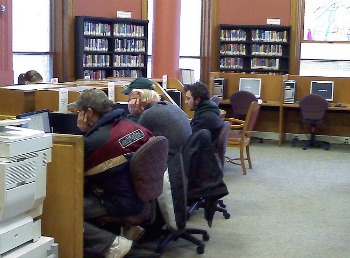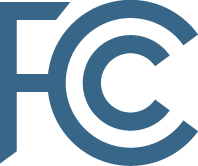The Federal Communications Commission (FCC) has a message for school librarians angered over a recent New York Times story that mentions the creation of a “digital literacy corps”: no one is trying to usurp their jobs.

Three pm, computer room at the Hackley Public Library
“It’s not targeted at teaching kids in schools,” says Josh Gottheimer, FCC’s senior counselor to the chairman, about the proposed $200 million federal plan for the creation of a digital literacy program. “It’s really about families and others in the community. We’re not trying to duplicate but to close the gap for others.”
School librarians were up in arms, taking to blogs and social media with angry posts following the May 29 story, “Wasting Time Is New Divide in Digital Era,” by Matt Richtel.
 While the FCC is considering the creation of a digital literacy corps, confirms Gottheimer, this would involve classes taught after hours and to the general public, not directly to students in the classroom or school library. The program could receive up to $50 million a year over four years, he says, but no decision has been made as of yet. And schools and public libraries were picked because of the ability for the general public to come to these sites.
While the FCC is considering the creation of a digital literacy corps, confirms Gottheimer, this would involve classes taught after hours and to the general public, not directly to students in the classroom or school library. The program could receive up to $50 million a year over four years, he says, but no decision has been made as of yet. And schools and public libraries were picked because of the ability for the general public to come to these sites.
As for schools, Gottheimer says, “It’s their choice, if they so desire, to be part of this process.”
School librarians reacted so strongly to the story that representatives of the American Library Association (ALA) reached out to some bloggers to help clarify the role the ALA has had with the FCC over the proposal to help quell concerns.
“This is not for a corps of people to go out and do training, but for schools and libraries to help frame classes for the general public and they’re not for children,” says Marijke Visser, assistant director of ALA’s Office for Information Technology Policy. “Schools would be eligible for the money if they were open after school hours.”
Some say the ensuing confusion stemming from the story actually helped illuminate the need for school and public librarians to better advocate for their role in educating students—and the public—about digital literacy, says Susan Ballard, president-elect of the American Association of School Librarians.
“We’re now alerted to the fact that we have to get a cultural change so people understand what school, public, and academic librarians do,” she says. “So we have some work to do, and immediately.”
Photo by Hackley Public Library.



If the federal government wants public and school libraries to help teach the public about technology, then the government should fully fund public and school libaries. If libraries got the funding they needed and didn’t have to keep cutting hours and services, then the public would stand a much better chance for lifelong learning opportunities. I am open (unpaid) extra hours after my school day ends for students who don’t have computers or internet access from home or who just need a quiet place to work before sports practice or games. If I could get paid for that time, I’d be happy to collect that money.
This just goes to show how out-of-touch ALA and AASL are with what is happening to school library programs throughout the U.S. I expect this kind of ignorance from government officials who are only concerned with figuring out how to spend taxpayer dollars on “programs” to which they can point and take credit for implementing. I am appalled that the president-elect of AASL would say “we are now alerted…”
I believe that the author of the Digital Shift story, Lauren Barack, used poor word choice, when she said that “representatives of the American Library Association (ALA) reached out to some bloggers to help clarify the role the ALA has had with the FCC over the proposal to help quell concerns.” What really happened was a conference call with a couple of invited bloggers to discuss OGR, OITP, and ALA’s comprehensive strategic plan related to advocacy around the National Broadband plan- and how school librarians were specifically being served by ALA’s actions.
I believe that some people misinterpreted Lauren Barack’s article, and why wouldn’t they? The words “quell concerns” imply that ALA was attempting to stifle debate. I would like all ALA members to remember that the Digital Shift is not an ALA publication, and Ms. Barack is a trade news reporter.
The actions that ALA, OGR and OITP are taking around the National Broadband Plan (NBP) are specifically designed to help preserve E-Rate funding. E-Rate is absolutely essential to the future health and vitality of school librarians. Diverting funds from E-Rate to fund a Digital Literacy Corps is ALA’s primary concern.
What exactly will this new DLC teach people? How to do a job search? And who exactly is going to walk/drive to a school library for this “training”? The parents of the kids who go there already? Seriously? My ten year old could teach people more about digital literacy right here in the house. This is an insult to school librarians softened by the promise of $$$, but an insult (and waste) none the less. The people who need this the most won’t be showing up at a school library. If you really want to reach them open up Digital Literacy Centers in Walmarts, in between the mini McDonalds and Taco Bell kiosks.
What exactly will this new DLC teach people? How to do a job search? And who exactly is going to walk/drive to a school library for this “training”? The parents of the kids who go there already? Seriously? My ten year old could teach people more about digital literacy right here in the house. This is an insult to school librarians softened by the promise of $$$, but an insult (and waste) none the less. The people who need this the most won’t be showing up at a school library. If you really want to reach them open up Digital Literacy Centers in Walmarts, in between the mini McDonalds and Taco Bell kiosks.